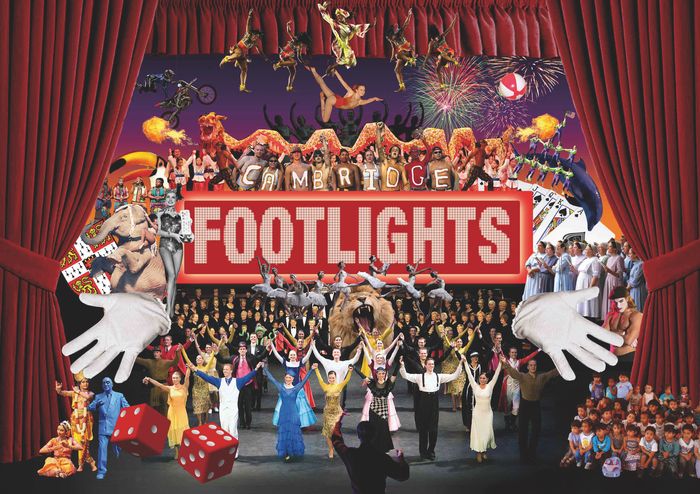Sleuth! ‘would stump Poirot’
This spooky mystery caper is a must-see for crime buffs

Anthony Shaffer’s Sleuth! is an eerie, amusing and murderous way to spend an evening. Almost as murderous as I was when I found out my editor was sending me to see a play featuring clowns.
The curtain rises on an impressively elaborate set, complete with a sarcophagus and a frankly terrifying automated sailor doll that wouldn’t be out of place in a Christie or a Sayers. That is, of course, the entire point: the show is both an intriguing, twist-filled story in its own right and a critical overview of the Golden Age of Detective Fiction. The central characters are Andrew Wyke (Todd Boyce), an eccentric crime writer with a penchant for occasionally inconsistent accents, and Milo Tindle (Neil McDermott), a second-generation immigrant whose cynical attitude towards melodramatic crime fiction causes friction between the pair. The two actors carry the majority of the production, bouncing off each other to maintain a manic energy for the entire two hours. Boyce and McDermott bounce off each other, imitating each other’s performances as roles shift. McDermott channels Boyce when Tindle gets carried away in the macabre aesthetic of criminality, and vice versa when Wyke is caught on the back foot and his control slips away.
“The show is both an intriguing, twist-filled story in its own right and a critical overview of the Golden Age of Detective Fiction”
As the endless night progresses, it descends into an increasingly intricate game of wits that is impossible to describe in any detail without giving the game away. The story involves (at last count) a quintuple bluff so labyrinthine that I cannot even allude to the fifth twist without spoiling the previous four.
“It descends into an increasingly intricate game of wits that is impossible to describe in any detail without giving the game away”
The plot is supported by its insightful class analysis, underscored as it is by the debate of who murder mysteries are for. Are they truly only “the recreation of noble minds?” Or are they for the enjoyment of the masses? While planning a potential burglary, Tindle rebukes anything but practical tools while Wyke desperately clings to a need for the poetic touch, whether that’s the criminal wearing a clown costume or the shooting of mantelpiece ornaments because it would look impressive in the crime scene report. These stark divisions blur, however, as the talented Mr Tindle also becomes caught up in the excitement of ‘the game’, and forgets his moral high ground about the real people involved. Initially, the attitudes towards women at times felt a little outdated, as the ladies vanish, serving as no more than props and prizes in Tindle and Wyke’s games. However, these attitudes are also crucial, because they are a reflection of how the characters view everyone in their lives: they are misogynists, but also plain immoral. Which makes their self-destructive actions all the more fun to watch.
“The plot is supported by its insightful class analysis, underscored as it is by the debate of who murder mysteries are for”
Shaffer, a Cambridge law graduate, does not shy away from criticisms of the justice system (a man after my own heart, as I found myself adding to my dissertation notes while writing this review). During a discussion about self-defence in English law, Wyce remarks “property has always been more highly regarded in England than people.” This encapsulates the show’s thesis statement: representations of status, wealth or intelligence don’t care about the sacrifice of a few people. Whether this idea was influenced by themes running through the Golden Era of Detective Fiction or the English class system, it’s impossible to say.
“Shaffer, a Cambridge law graduate, does not shy away from criticisms of the justice system”
Sleuth! preemptively deals with a large amount of the criticism that could be levelled at such a show: it is far-fetched, unrealistically complicated and sometimes downright ridiculous. Despite featuring penny-dreadful plots, character tropes that would be at home in a cartoon, each new game ends with an unrealistically satisfying conclusion. ‘That’s unrealistic! ’ someone should have heckled. But of course they didn’t, because this was a quintessential murder mystery. Both the players and the game have become so detached from reality that any expectation of realistic standards is foolish. The characters had odd quirks (why would there be anything suspicious about the reclusive village snob inviting a man he hardly knows to visit?), and even the least likely outcomes happen (as we all know, once you eliminate the impossible, whatever remains, however improbable, must be the truth).
With stellar performances from the small cast, astonishing twists that would stump Poirot, and clever red herrings in the programme, this mysterious affair in Wiltshire leaves its audience with a new perspective on the detective genre, and is certainly not to be missed. Unless you hate clowns.
 News / Clare Hall spent over £500k opposing busway 24 December 2025
News / Clare Hall spent over £500k opposing busway 24 December 2025 Comment / The ‘class’ of Cambridge24 December 2025
Comment / The ‘class’ of Cambridge24 December 2025 News / Caius mourns its tree-mendous loss23 December 2025
News / Caius mourns its tree-mendous loss23 December 2025 Comment / Yes, I’m brown – but I have more important things to say22 December 2025
Comment / Yes, I’m brown – but I have more important things to say22 December 2025 News / Girton JCR publishes open letter expressing solidarity with Palestine25 December 2025
News / Girton JCR publishes open letter expressing solidarity with Palestine25 December 2025










